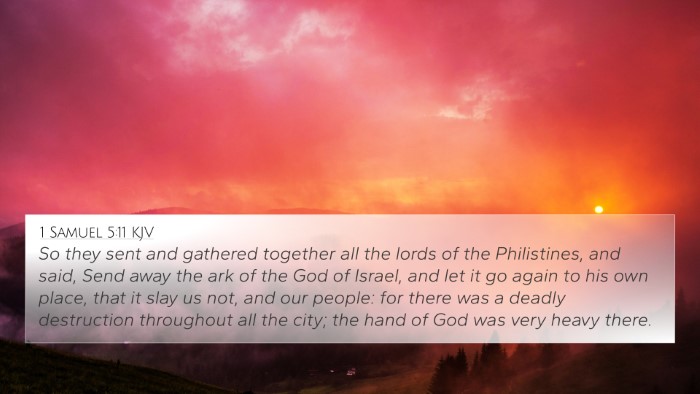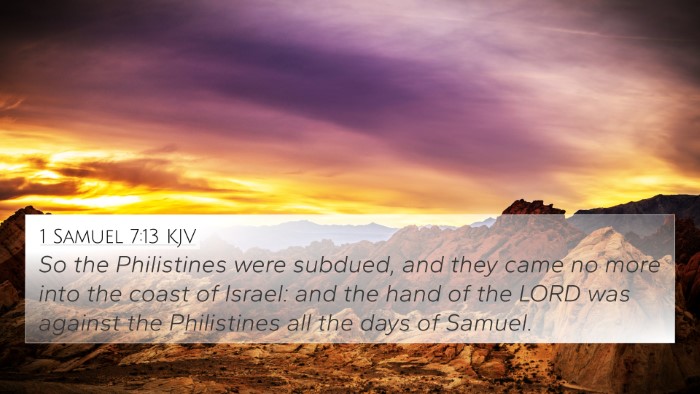Understanding Deuteronomy 2:15
Deuteronomy 2:15 states, "For indeed the hand of the Lord was against them, to destroy them from the midst of the camp, until they were consumed." This verse speaks to the judgment of God upon a generation of Israelites who disobeyed His commands and reflects themes of divine justice and sovereignty. Several public domain commentaries offer rich insights into the meaning of this verse.
Meaning and Interpretation
In the context of Deuteronomy 2, Moses recounts the journey of the Israelites and the challenges they faced. The verse reveals that God's hand was actively working against those who rebelled, demonstrating His control over events. This emphasis on God's sovereignty is crucial for understanding the relationship between divine judgment and human actions.
Insights from Commentaries
Matthew Henry
Matthew Henry notes that the "hand of the Lord" signifies God's power and intervention in human affairs. He interprets this verse as a reminder of God's justice, stating that when God's people turn away from Him, they invite judgment upon themselves. The destruction referenced highlights the seriousness of disobedience and reinforces the theme that God will not tolerate rebellion forever.
Albert Barnes
Albert Barnes elaborates that God's hand against those in rebellion illustrates the consequences of turning from God's path. He emphasizes that this verse serves as a warning for all believers regarding the importance of adhering to God's commands, as disobedience can lead to severe repercussions.
Adam Clarke
Adam Clarke discusses the implications of the divine hand being against the Israelites, interpreting it as a sign of God’s displeasure. Clarke suggests that this verse reflects not only God's judgment but also His mercy, indicating that while punishment is certain, God still provides opportunities for repentance and restoration.
Thematic Connections and Cross-References
Deuteronomy 2:15 serves as a powerful reminder of themes like judgment, divine sovereignty, and the consequences of disobedience. There are several Bible verses that relate to this theme which can be explored through cross-referencing Biblical texts:
- Numbers 14:20-23 - God’s pronouncement of judgment on the Israelites for their lack of faith.
- Hebrews 3:17-19 - The warning against unbelief paralleling the Old Testament account of the Israelites in the wilderness.
- Psalm 95:10-11 - A reflection on the Israelites' disobedience and its consequences.
- Romans 1:18 - The revelation of God’s wrath against ungodliness and unrighteousness.
- Galatians 6:7-8 - The principle of reaping what one sows, emphasizing divine justice.
- 1 Corinthians 10:5 - Mention of Israelites who were punished in the wilderness for their disbelief.
- Proverbs 3:34 - Addressing the relation of being scornful towards God's ways and judgment.
- 2 Thessalonians 1:6 - Discussing how God will repay those who trouble His people.
- Revelation 20:15 - A final judgment for those whose names are not written in the Book of Life, resonating with themes of divine judgment.
- John 3:36 - Affirming that the wrath of God abides on those who do not obey the Son.
Tools for Bible Cross-Referencing
When studying passages like Deuteronomy 2:15, utilizing tools for Bible cross-referencing can deepen understanding. These might include:
- Bible concordance - A reference book that lists words and their locations in the Bible.
- Bible cross-reference guide - A resource that connects related verses across the scriptures.
- Cross-reference Bible study - Techniques for finding connections between verses during personal or group study.
- Bible reference resources - Various tools including digital software or study Bibles that provide cross-references.
- How to use Bible cross-references - Tips and methods for effectively linking scriptures.
- Bible chain references - A study method that follows themes or topics throughout the Bible.
Conclusion
Deuteronomy 2:15 serves as a sobering reminder of God's sovereignty and His judgment against disobedience. By engaging with various commentaries and utilizing tools for cross-referencing, believers can gain a richer understanding of this verse and its implications. Identifying connections between Old and New Testament scriptures also enhances the understanding of God’s continuous theme of justice and mercy throughout the Bible.
Further Study
For those seeking to deepen their study, consider reflecting on Bible verses related to different themes such as judgment, mercy, and divine authority. This exploration can lead to a greater comprehension of how these themes interweave throughout the entire Biblical narrative and enhance the study of scriptures using comparative Bible verse analysis techniques.













